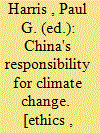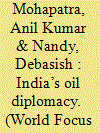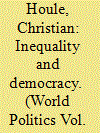| Srl | Item |
| 1 |
ID:
115459


|
|
|
|
|
| Publication |
Bristol, Policy Press, 2011.
|
| Description |
xi,241p.
|
| Standard Number |
9781847428127
|
|
|
|
|
|
|
|
|
|
|
|
Copies: C:1/I:0,R:0,Q:0
Circulation
| Accession# | Call# | Current Location | Status | Policy | Location |
| 056855 | 363.738745250951/HAR 056855 | Main | On Shelf | General | |
|
|
|
|
| 2 |
ID:
142723


|
|
|
|
|
| Summary/Abstract |
In the era of globalisation, among so many other things, closeness and cooperation between and among states in the economic field has been one of the significant developments. Of course, it might have put some adverse impact or effect on some weak economies vis-a-vis strong ones but a complete independent and isolationist policy in so far as the economic aspect of globalisation is concerned would be neither pragmatic nor desirable. Especially the developments following the disintegration of the former USSR in early 1990s paved the way for increasing economic cooperation across the globe. The imperatives of economic cooperation had even urged the People’s Republic of China to forgo its earlier adherence to the model of closed economy. In a similar fashion, India had to abandon its Non-Aligned hangover and state-led economy that led to a grave fiscal situation which threatened to ‘bankrupt the federal exchequer’ (Ganguly et al., 2011: 13) towards the end of 1980s.
|
|
|
|
|
|
|
|
|
|
|
|
|
|
|
|
| 3 |
ID:
091119


|
|
|
|
|
| Publication |
2009.
|
| Summary/Abstract |
Under what conditions do democracies emerge and consolidate? Recent theories suggest that inequality is among the leading determinants of both democratization and consolidation. By contrast, this article argues that inequality harms consolidation but has no net effect on democratization. The author shows that the existing theories that link inequality to democratization suffer from serious limitations: (1) they are useful only for understanding transitions from below and thus do not apply to many other transitions (that is, those from above); (2) even for democratization from below, their predictions are unlikely to hold, since inequality actually has two opposite effects; and (3) they ignore collective action problems, which reduces their explanatory power. However, these objections do not affect the relationship between inequality and consolidation. In particular, while inequality has two opposite effects on the probability of transition to democracy, it unambiguously increases the probability of transition away from democracy. This article conducts the most comprehensive empirical test to date of the relationship between inequality and democracy. It finds no support for the main democratization theories. Contrary to what they predict, estimation suggests neither a monotonic negative nor an inverted U-shaped relationship. Yet inequality increases the probability of backsliding from democracy to dictatorship.
|
|
|
|
|
|
|
|
|
|
|
|
|
|
|
|